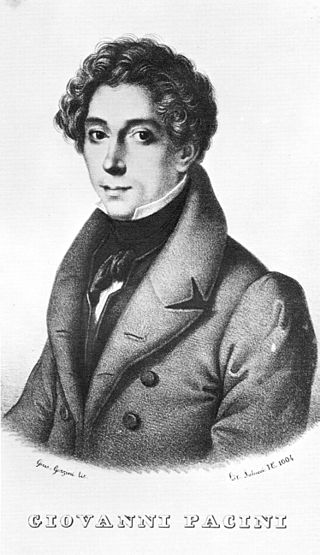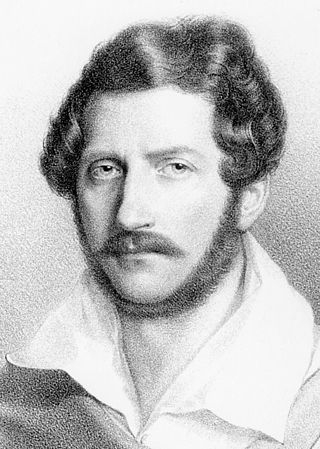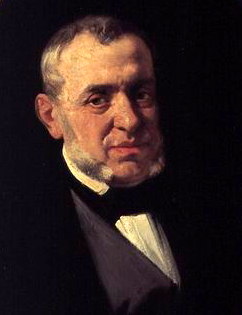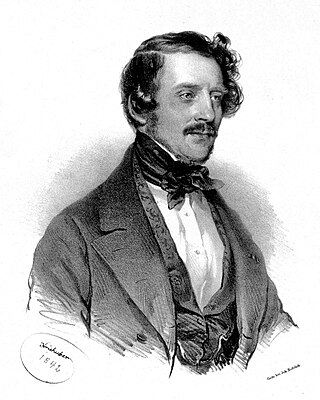
Maria Anna MarziaAlboni was an Italian contralto opera singer. She is considered "one of the greatest contraltos in operatic history".

Giovanni Pacini was an Italian composer, best known for his operas. Pacini was born in Catania, Sicily, the son of the buffo Luigi Pacini, who was to appear in the premieres of many of Giovanni's operas. The family was of Tuscan origin, living in Catania when the composer was born. He served as the Florence Conservatory's first director from 1849 through 1862.

Alessandro nelle Indie is an opera seria in two acts by Giovanni Pacini to a libretto by Andrea Leone Tottola and Giovanni Schmidt, based on Alessandro nell'Indie by Pietro Metastasio. It was premiered at the Teatro di San Carlo in Naples on 29 September 1824, and had a total of 38 performances in its first season.

Caterina Cornaro ossia La Regina di Cipro is a tragedia lirica, or opera, in a prologue and two acts by Gaetano Donizetti. Giacomo Sacchero wrote the Italian libretto after Jules-Henri Vernoy de Saint-Georges' libretto for Halévy's La reine de Chypre (1841). It is based on the life of Caterina Cornaro, Queen of Cyprus from 1474 to 1489. It premiered at the Teatro San Carlo, Naples on 12 January 1844.

Gianni di Parigi is an 1839 melodramma comico in two acts with music by Gaetano Donizetti to a libretto by Felice Romani, which had previously been set by Francesco Morlacchi in 1818 and by Giovanni Antonio Speranza in 1836.

Orazi e Curiazi is an opera by the Italian composer Saverio Mercadante. It takes the form of a tragedia lirica in three acts. The libretto, by Salvadore Cammarano, is based on the Roman legend of the fight between Horatii and Curiatii. It was first performed at the Teatro San Carlo, Naples, on 10 November 1846.

Eugenia Tadolini was an Italian operatic soprano. Admired for the beauty of her voice and stage presence, she was one of Donizetti's favourite singers. During her career she created over 20 leading roles, including the title roles in Donizetti's Linda di Chamounix and Maria di Rohan and Verdi's Alzira. She was born in Forlì and studied music there and in Bologna before making her debut in Florence in 1828. She sang in all of Italy's leading opera houses, as well as in Paris, Vienna, and London before retiring from the stage in 1852. She spent her remaining years first in Naples, where she had been the Teatro San Carlo's reigning prima donna for many years, and then in Paris, where she died of typhoid fever at the age of 63. From 1827 to 1834, she was married to the Italian composer and singing teacher, Giovanni Tadolini.
Antonietta Marini-Rainieri was an Italian operatic soprano active during the first half of the 19th century. She was married to lauded operatic bass Ignazio Marini and often appeared on stage with him. In 1835 she portrayed Giulietta opposite Amalia Schütz Oldosi as Romeo in the Teatro Regio di Parma's first staging of Vincenzo Bellini's I Capuleti e i Montecchi. At La Scala she portrayed roles in the world premieres of Giuseppe Verdi's first two operas: Leonora in Oberto (1839) and the Marchesa del Poggio in Un giorno di regno (1840). She also appeared at that house as the Princess of Navarra in the premiere of Gaetano Donizetti's Gianni di Parigi (1839). In 1843, she sang the title role in the premiere of Giovanni Pacini's Maria, regina d'Inghilterra at the Teatro Carolino in Palermo. She reprised that role in December 1843 at La Scala, and at the Teatro Carlo Felice in February 1844.
Adelaide Tosi was an Italian operatic soprano.

Adelia, o La figlia dell'arciere is an opera in three acts by Gaetano Donizetti. The Italian libretto was written partly by Felice Romani and by Girolamo Maria Marini, a part-time poet who had achieved notability the previous year with Otto Nicolai's Il templario. The opera premiered at the Teatro Apollo, Rome on 11 February 1841.

Medea is an opera in three acts composed by Giovanni Pacini to a libretto by Benedetto Castiglia. It premiered on 28 November 1843 at the Teatro Carolino in Palermo, conducted by the composer with Geltrude Bortolotti in the title role. The libretto is based on the plays Medea by Euripides and Médée by Pierre Corneille.

Adelaide Borghi-Mamo was an Italian operatic mezzo-soprano who had an active international career from the 1840s through the 1880s. She was married to tenor Michele Mamo and their daughter, soprano Erminia Borghi-Mamo, also had a successful singing career.

Franca Mattiucci is an Italian operatic mezzo-soprano who had an active international career from 1963 to 1987. In her native country she made appearances at the Arena di Verona Festival, the Baths of Caracalla, La Fenice, La Scala, the Teatro Comunale di Bologna, the Teatro della Pergola, the Teatro dell'Opera di Roma, the Teatro di San Carlo, the Teatro Donizetti, the Teatro Margherita, the Teatro Massimo Bellini, the Teatro Massimo, the Teatro Regio di Parma, and the Teatro Regio di Torino. On the international stage she performed at the Hamburg State Opera, the Hungarian State Opera, the Liceu, the Lyric Opera of Chicago, the Opéra de Monte-Carlo, the Sofia National Opera, the Teatro Colón, the Teatro Nacional de São Carlos, the Teatro Real, and the Vienna State Opera among others.

L'ultimo giorno di Pompei is an opera in two acts composed by Giovanni Pacini to an Italian libretto by Andrea Leone Tottola. It premiered to great success at the Teatro San Carlo in Naples on 19 November 1825 followed by productions in the major opera houses of Italy, Austria, France, and Portugal. When Pacini's popularity declined in the mid-19th century, the opera was all but forgotten until 1996 when it received its first performance in modern times at the Festival della Valle d'Itria in Martina Franca. L'ultimo giorno di Pompei influenced either directly or indirectly several other 19th-century works, most notably Karl Bryullov's 1833 painting, The Last Day of Pompeii.

Maria Teresa Rebecca Brambilla better known as Marietta Brambilla was an Italian contralto who sang leading roles in the opera houses of Europe from 1827 until her retirement from the stage in 1848. She is best known today for having created the roles of Maffio Orsini in Donizetti's Lucrezia Borgia and Pierotto in his Linda di Chamounix, but she also created several other roles in lesser-known works. She was the elder sister of the opera singers Teresa and Giuseppina Brambilla and the aunt of Teresina Brambilla who was also an opera singer.

Fanny Eckerlin (1802–1842) was an Italian mezzo-soprano who also sang contralto roles. During her career she was highly regarded, drawing favorable comparisons to Benedetta Rosmunda Pisaroni, but today she is remembered, if at all, for her association with the early career of Gaetano Donizetti, including creating the title role in his first publicly-performed opera, Enrico di Borgogna.
Pio Botticelli was an Italian bass-baritone active in the opera houses of Italy from 1810 until the mid-1840s. Amongst the numerous roles he created in world premieres were Pietro il Grande in Donizetti's Il falegname di Livonia and The Caliph in Pacini's La schiava in Bagdad. He also sang the role of Leucippo in the Austrian premiere of Rossini's Zelmira.
Savino Monelli was an Italian tenor prominent in the opera houses of Italy from 1806 until 1830. Amongst the numerous roles he created in world premieres were Giannetto in Rossini's La gazza ladra, Enrico in Donizetti's L'ajo nell'imbarazzo and Nadir in Pacini's La schiava in Bagdad. He was born in Fermo where he initially studied music. After leaving the stage, he retired to Fermo and died there five years later at the age of 52.

Luigi Pacini was an Italian opera singer who appeared on the principal stages of his native country as well as in Spain and Austria in a career that spanned over 30 years. He began his career as a tenor but in 1805 started singing bass roles and rose to prominence in that repertoire. Amongst the numerous roles he created in world premieres were Geronio in Rossini's Il turco in Italia and Parmenione in his L'occasione fa il ladro. Pacini was born in the Province of Pistoia and died in Viareggio where in his later years he taught singing at the conservatory founded by his son, Giovanni Pacini.













